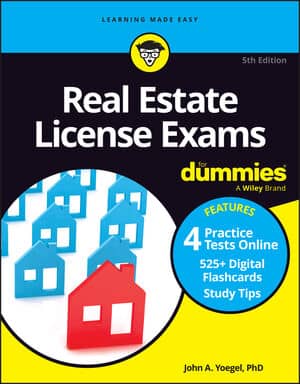The Real Estate License Exam will ask questions about property tax exemptions. Some properties are exempted from paying real estate taxes, and other property owners may pay reduced taxes for one reason or another. All information is subject to state and local law, so you need to check to see what kinds of properties are fully or partially tax exempt and what exemptions are available for certain groups of people.
Fully tax-exempt properties
Government-owned properties, or properties owned by federal, state, county, town, city, village, township, borough, and any other level of government, are tax exempt to the extent that governments don’t pay taxes to themselves nor do they generally pay taxes to a higher or lower level of government within which the property is located, provided that the property is also located within the borders of the government that owns it.
So a town not only won’t usually pay taxes to itself for a town park, but it also won’t pay real estate taxes to the county for that park. The opposite also is true. The county won’t pay taxes to the town for a county park within the town’s borders. Federal government-owned and state-owned lands likewise are exempt from paying local real estate taxes.
The one exception to this exemption is where property is owned by one government and is located in a completely different governmental jurisdiction.
For example, Town A owns a reservoir in Town B. Town A may very likely pay taxes to Town B. But if Towns A and B are located in the same county, neither pays county taxes on the reservoir. Likewise, if County A owns property in County B, it probably will pay taxes to County B. This may vary by state, so check it out.
Other properties that are fully tax-exempt, in general, include the following:
School districts, water districts, sewer districts, and similar public service organizations that own property
Property owned by private educational institutions, religious organizations, hospitals, and charitable groups
Partial tax exemptions
Different states have different rules and programs that may exempt a portion of property taxes. You probably won’t get a question on an exam about specific exemptions in your state, but you nevertheless need to check them out just in case.
A partial exemption may work in one of several ways: It can apply to the taxes directly by reducing the amount owed, it can apply to the assessment by reducing the assessment for an individual, or it can apply by reducing the assessment for a particular class or type of property. Here are a few examples:
Partial relief of total taxes that have to be paid may be granted. This partial exemption usually is a percentage of the taxes due and may be offered to senior citizens or the disabled. Income qualifications may also be attached to the exemption. So a person may have to be 65 years old and making less than a certain amount of money to qualify for an exemption.
Another type of partial tax exemption is a reduction in the assessment on the property. This type of exemption typically is offered to veterans. The exemption may be a fixed amount or a percentage of the assessment and varies according to whether the veteran was in combat and/or is disabled. Special programs may provide relief in the form of reduced assessments from various specific taxes such as for schools.
Some states also provide different assessment ratios for different types of properties. For example, commercial properties may be assessed at higher assessment ratios than residential properties. What that means is that if you have a residential and a commercial property that have the same market value, the commercial property pays a higher amount of property taxes than the residential property of equal value.
Remember, when you’re an agent selling a property, you need to find out the taxes on the property as if no exemptions were applicable. Your buyer may not qualify for the same exemptions as the seller. You can find out the taxes on the property by consulting the municipal or county assessor to get the assessment information and the receiver of taxes to get the tax rate.

